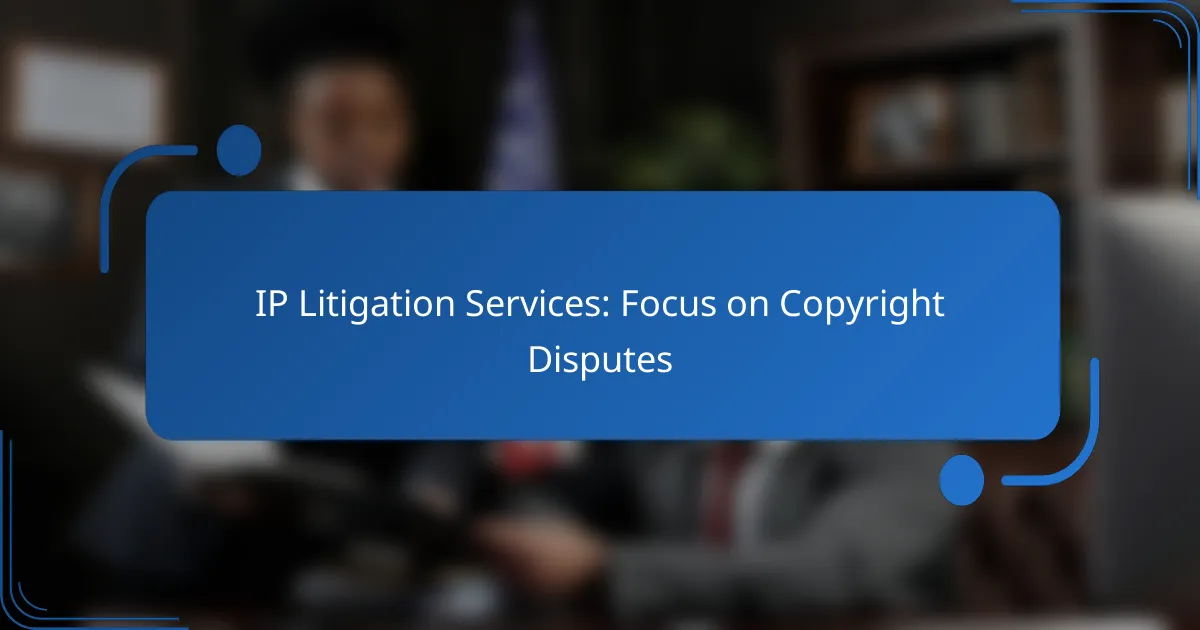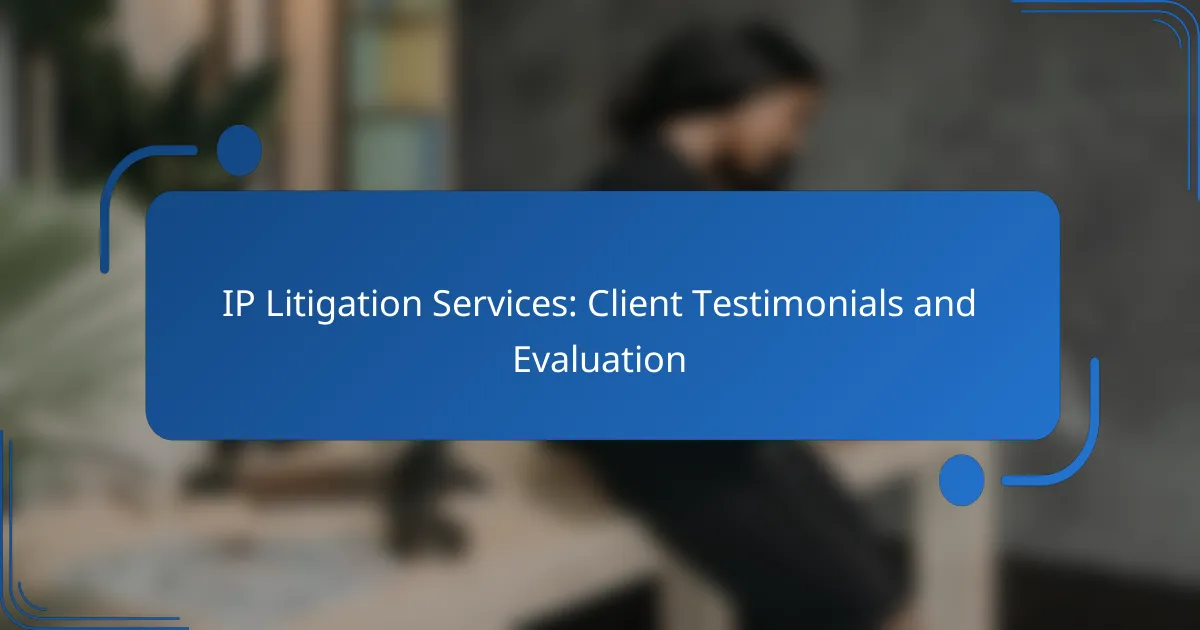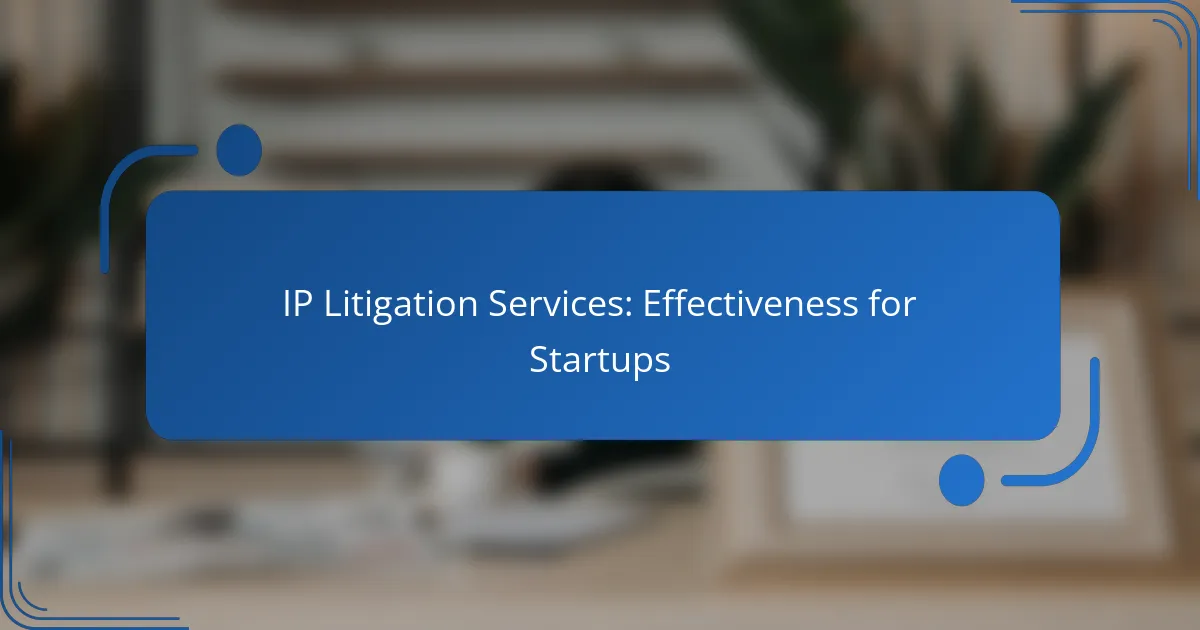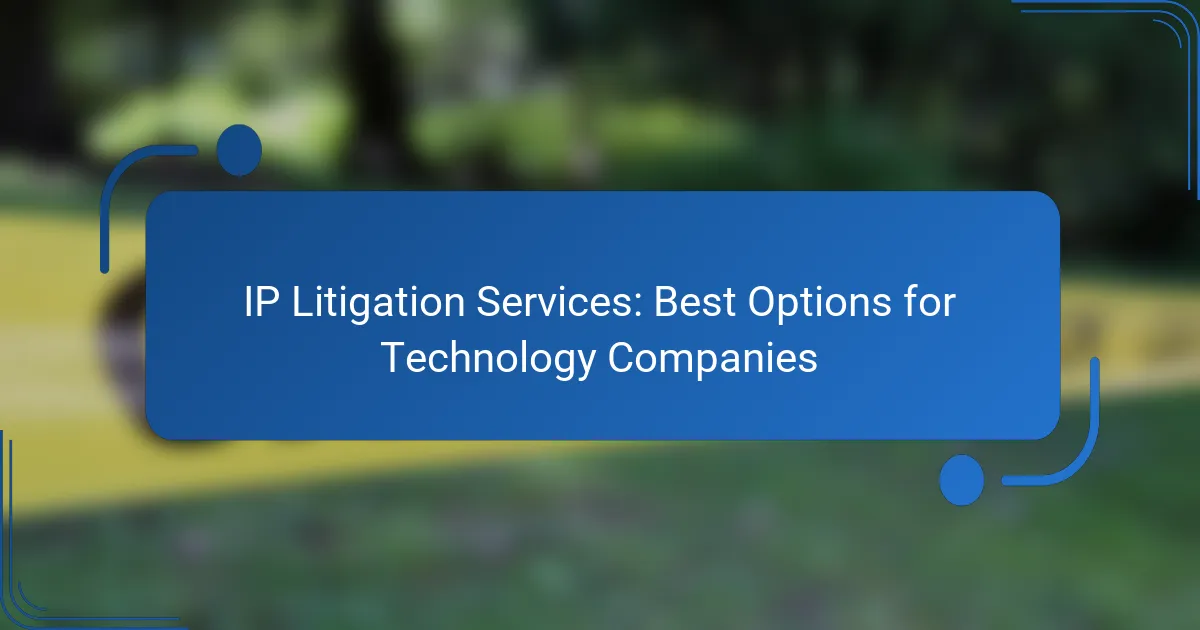IP litigation services focused on copyright disputes provide essential solutions for individuals and entities facing unauthorized use of their copyrighted works. With various approaches such as mediation, litigation strategies, and settlement negotiations, parties can select the most effective method tailored to their unique situations. Understanding the complexities and potential costs involved in copyright litigation is crucial for navigating these challenging disputes.

What Are the Key Copyright Dispute Solutions in IP Litigation?
Key copyright dispute solutions in IP litigation include mediation, litigation strategies, settlement negotiations, alternative dispute resolution, and injunction requests. Each method offers distinct advantages and considerations, allowing parties to choose the most suitable approach based on their specific circumstances.
Mediation Services
Mediation services provide a collaborative environment for parties to resolve copyright disputes with the help of a neutral third party. This process encourages open communication and can lead to mutually beneficial agreements without the need for formal litigation.
During mediation, both parties present their cases, and the mediator facilitates discussions to identify common ground. This approach can save time and costs compared to traditional litigation, often resulting in resolutions that preserve relationships.
Litigation Strategies
Litigation strategies in copyright disputes involve preparing for court proceedings to enforce or defend copyright claims. This may include gathering evidence, filing motions, and developing a comprehensive legal argument tailored to the specifics of the case.
Effective strategies often require a thorough understanding of copyright law and the ability to anticipate the opposing party’s arguments. Engaging experienced legal counsel is crucial to navigating the complexities of litigation and maximizing the chances of a favorable outcome.
Settlement Negotiations
Settlement negotiations aim to resolve copyright disputes before reaching trial, often leading to quicker and less costly outcomes. Parties can negotiate terms that address their interests, including financial compensation or licensing agreements.
Successful negotiations typically involve clear communication and a willingness to compromise. It’s important to assess the strengths and weaknesses of each party’s position to facilitate a fair settlement that avoids the uncertainties of court decisions.
Alternative Dispute Resolution
Alternative dispute resolution (ADR) encompasses various methods, such as arbitration and mediation, to resolve copyright disputes outside of traditional court settings. ADR can be more flexible and faster than litigation, making it an attractive option for many parties.
Choosing ADR often involves considering factors such as the desired level of formality, confidentiality, and the potential for a binding resolution. Parties should evaluate their specific needs and the nature of the dispute when selecting an ADR method.
Injunction Requests
Injunction requests are legal orders that can prevent further infringement of copyright while a dispute is being resolved. These requests can be crucial for protecting intellectual property rights and minimizing potential damages during litigation.
To obtain an injunction, the requesting party must demonstrate a likelihood of success on the merits of the case and the potential for irreparable harm. This process requires careful preparation and legal expertise to effectively argue for the need for immediate relief.
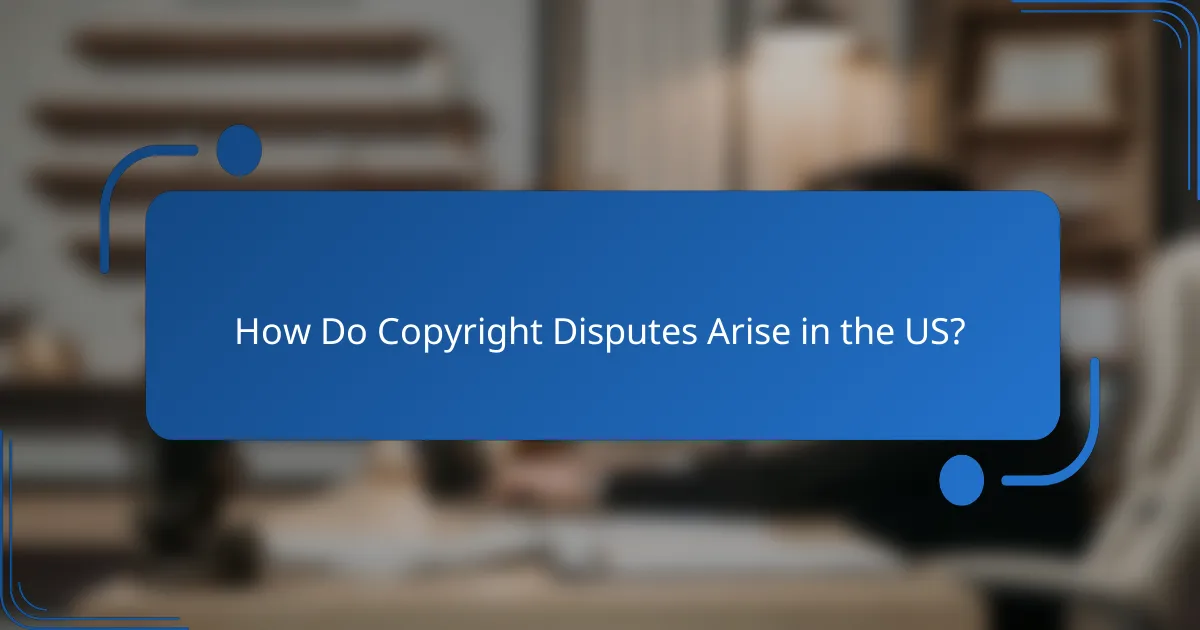
How Do Copyright Disputes Arise in the US?
Copyright disputes in the US typically arise when an individual or entity uses a copyrighted work without permission from the copyright holder. These disputes can stem from various situations, including unauthorized use, plagiarism, and violations of license agreements.
Unauthorized Use of Works
Unauthorized use occurs when someone reproduces, distributes, or displays a copyrighted work without obtaining the necessary permissions. This can happen in various contexts, such as using music in a video, copying text from a book, or sharing software without a license.
To avoid such disputes, individuals and businesses should always seek permission or a license before using copyrighted materials. Familiarizing oneself with fair use provisions can also help, but these exceptions can be complex and context-dependent.
Plagiarism Cases
Plagiarism involves presenting someone else’s work or ideas as one’s own, which can lead to copyright disputes if the original creator decides to take action. While plagiarism is primarily an ethical issue, it can also have legal implications if it violates copyright laws.
To mitigate the risk of plagiarism claims, always provide proper attribution when using others’ works and ensure that your work is original. Utilizing plagiarism detection tools can also help identify potential issues before publication.
License Agreement Violations
License agreement violations occur when the terms of a licensing contract are not followed, such as exceeding the scope of use or failing to pay required fees. These violations can lead to legal action from the copyright holder seeking damages or enforcement of the agreement.
To prevent license agreement disputes, carefully review all terms and conditions before using copyrighted materials. Keep records of licenses and communications with copyright holders to ensure compliance and address any potential misunderstandings promptly.
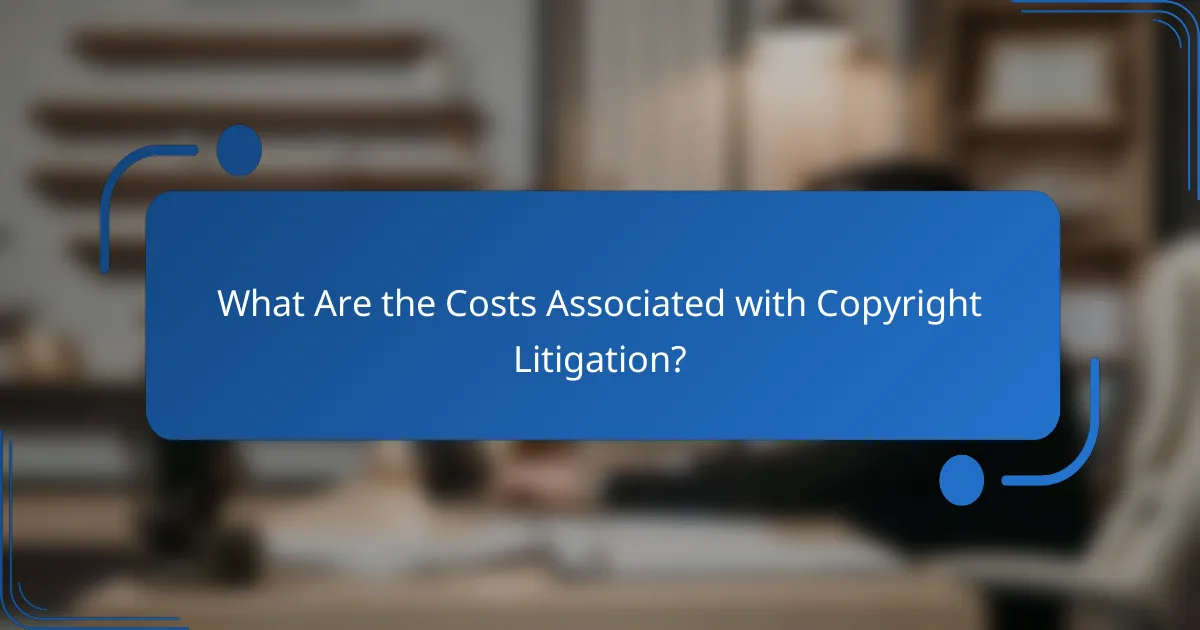
What Are the Costs Associated with Copyright Litigation?
Copyright litigation can be expensive, with costs varying significantly based on the complexity of the case and the jurisdiction. Key expenses typically include attorney fees, court costs, and expert witness expenses, all of which can add up quickly.
Attorney Fees
Attorney fees are often the largest expense in copyright litigation. Rates can vary widely, typically ranging from $150 to $600 per hour, depending on the attorney’s experience and the case’s complexity. Some lawyers may offer flat fees for specific services, while others may work on a contingency basis, taking a percentage of any awarded damages.
When hiring an attorney, consider their expertise in copyright law and past success in similar cases. It’s advisable to discuss fee structures upfront to avoid unexpected costs later.
Court Costs
Court costs include filing fees, service fees, and other administrative expenses associated with the litigation process. Filing fees can range from $200 to $500, depending on the court and the nature of the case. Additional costs may arise from motions, appeals, or other procedural requirements.
It’s essential to budget for these costs early in the litigation process, as they can accumulate quickly. Some courts may offer fee waivers for qualifying individuals or entities, so it’s worth investigating these options if applicable.
Expert Witness Expenses
Expert witnesses can significantly impact the outcome of copyright disputes, but their services come at a cost. Fees for expert witnesses can range from $200 to over $1,000 per hour, depending on their qualifications and the complexity of their testimony. Additionally, you may incur costs for their preparation and travel expenses.
When considering expert witnesses, evaluate their relevance to your case and their ability to communicate effectively in court. Selecting the right expert can enhance your position, but be mindful of the associated costs and ensure they fit within your overall budget for litigation.
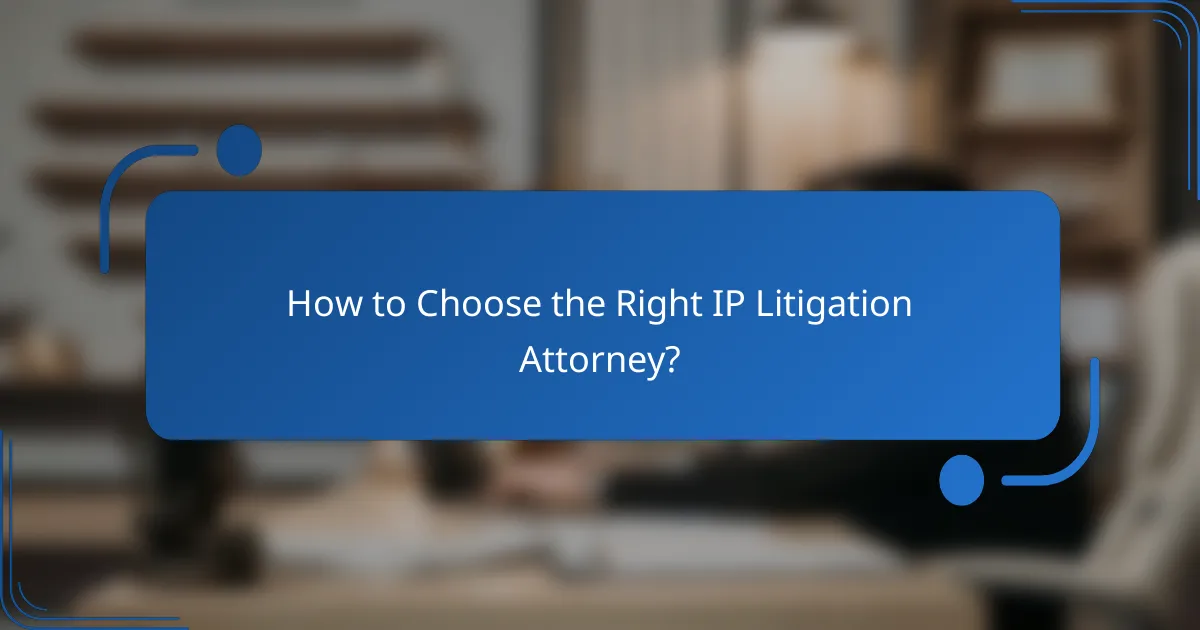
How to Choose the Right IP Litigation Attorney?
Choosing the right IP litigation attorney, particularly for copyright disputes, involves evaluating their expertise, success rate, and client feedback. A well-suited attorney can significantly impact the outcome of your case, ensuring your intellectual property rights are effectively defended.
Experience in Copyright Law
When selecting an IP litigation attorney, prioritize those with extensive experience in copyright law. Look for attorneys who have handled cases similar to yours, as familiarity with specific copyright issues can lead to more effective strategies.
Consider attorneys who have been practicing for at least five years in this niche. Their experience should include both litigation and negotiation, as many copyright disputes can be resolved outside of court.
Track Record of Success
A strong track record of success is crucial when choosing an IP litigation attorney. Review their history of winning cases, particularly in copyright disputes, to gauge their effectiveness. Successful outcomes can include favorable settlements or victories in court.
Request case studies or examples of past cases to better understand their approach and results. A good attorney should be able to demonstrate a history of achieving positive results for clients in similar situations.
Client Testimonials
Client testimonials provide valuable insights into an attorney’s capabilities and client service. Look for reviews that highlight their communication skills, responsiveness, and overall satisfaction with the legal representation provided.
Consider checking online platforms or legal directories for verified testimonials. Positive feedback from previous clients can indicate a reliable attorney who prioritizes their clients’ needs and works diligently on their behalf.
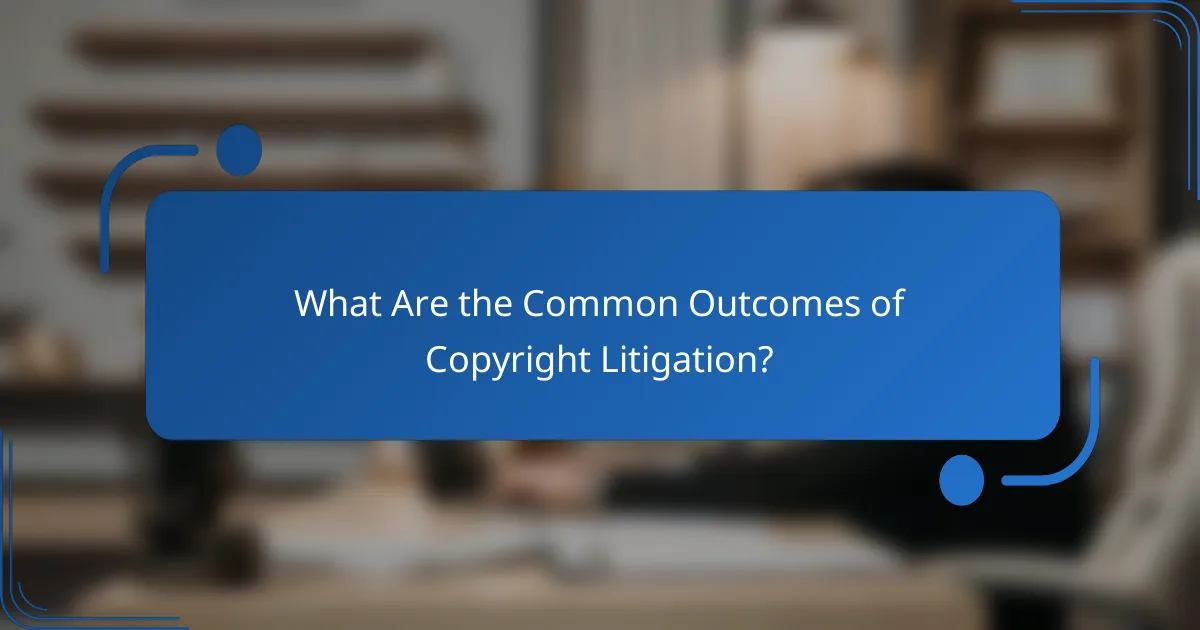
What Are the Common Outcomes of Copyright Litigation?
Copyright litigation can lead to several key outcomes, including monetary damages, injunctions against infringers, and settlement agreements. Each of these results can significantly impact both the copyright holder and the alleged infringer, influencing future business practices and legal strategies.
Monetary Damages
Monetary damages are often awarded to copyright holders to compensate for losses incurred due to infringement. These damages can range from actual damages, which reflect the financial loss suffered, to statutory damages, which can be set by the court and may vary widely based on the severity of the infringement.
In the United States, statutory damages can range from hundreds to tens of thousands of dollars per work infringed, depending on whether the infringement was willful. It’s crucial for copyright holders to document their losses meticulously to support their claims for damages.
Injunctions Against Infringers
An injunction is a court order that prohibits the infringer from continuing their infringing activities. This outcome is particularly important for copyright holders seeking to protect their works from further unauthorized use.
Injunctions can be temporary or permanent, depending on the case’s specifics. For instance, a temporary injunction may be issued quickly to prevent ongoing harm while the litigation is resolved, while a permanent injunction may be granted after a full trial if the court finds in favor of the copyright holder.
Settlement Agreements
Settlement agreements are a common resolution in copyright disputes, allowing both parties to avoid the uncertainties of trial. These agreements often involve the infringer agreeing to pay a specified amount and may include terms that allow for future use of the copyrighted material under certain conditions.
Settlements can be beneficial as they provide a quicker resolution and can save both parties significant legal costs. It’s advisable for parties to consider mediation or negotiation early in the process to explore potential settlements before escalating to litigation.
